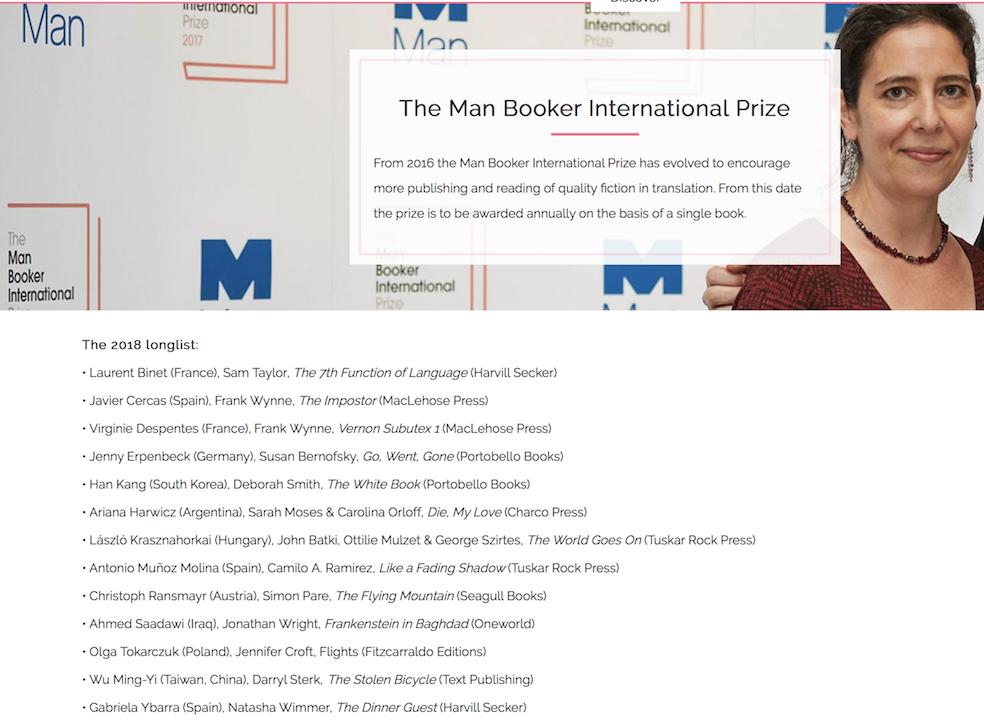Man Group, the hedge fund manager which sponsors the literary prize, launched a quantitative hedge fund in China last year catering to wealthy Chinese investors.
Well-known Taiwanese author Wu Ming-yi, whose novel The Stolen Bicycle was long-listed for the prestigious 2018 Man Booker International Prize, revealed on his Facebook page this morning that the organizers of the literary prize had changed his country of origin from “Taiwan” to “Taiwan, China,” a move that he said did not reflect his personal position.
Wu is one of 13 authors nominated for the prize, the leading literary award in the English-speaking world. According to the official web site, the Man Booker International Prize was established in 2005, biannually rewarding an author for a body of work originally written in any language as long as it was widely available in English. The Stolen Bicycle was first published in Chinese in 2015 and was translated into English by the Taipei-based Darryl Sterk.
Wu said he would seek assistance to have his proper nationality mentioned on the Man Booker web site.

The Man Booker Prize is backed by the Man Group, a sponsor of the arts and charitable initiatives. In December last year, the Financial Times reported that the Man Group had launched a quantitative hedge fund in China targeting “wealthy Chinese investors as it becomes the first foreign investment company to start an onshore hedge fund in the country.” Managed by Man’s AHL quantitative trading unit in Shanghai, the group said it would “trade across liquid markets in China, focusing initially on listed futures including agricultural commodities, industrial commodities, bonds, metals, energy and stock indices,” FT reported. According to the company web site, Man Group has US$103.5 billion in funds under management1 through its five investment management businesses, and opened its China office in 2012.

Comments by Wu on his Facebook page.
The controversy occurs as several international firms in recent weeks have given in to pressure from Beijing to change information on their web sites to depict Taiwan as “Taiwan, China” or “Taiwan, Province of China.”
In related developments, the big screen premiere of “Missing Johnny” (強尼‧凱克), a film produced by Taiwanese director director Hou Hsiao-hsien, has been cancelled after Chinese netizens accused one its lead actors, Lawrence Ko, of being a “Taiwan independence entertainer.” The film was scheduled to premiere in China on April 13. Taiwan Affairs Office Spokesman An Fengshan confirmed the boycott at a regular press conference on Wednesday.
The Chinese government will “never allow films to be shown on the mainland that include entertainers who support Taiwan’s independence or have made remarks or taken action in support of Taiwan independence,” he said.
Some netizens also claimed that Ko’s father, Ko I-chen, a big name in the Taiwanese film industry, is a long-time supporter of Taiwanese independence. In July 2016, an online campaign by the Chinese Communist Youth League targeting Chinese actress-turned-director Vicky Zhao succeeded in compelling the producers to drop Taiwanese award-winning actor Leon Dai from her movie “No Other Love.” Netizens accused Dai of supporting Taiwanese independence and Hong Kong’s Umbrella Movement.
UPDATE: After receiving criticism for its decision to change nationality information on its web site due to pressure from the Chinese embassy in London, the organizer of the Man Booker International Prize announced on April 4 that it was reversing its decision. As such, Mr. Wu’s country of origin will be changed back to “Taiwan.” The press release appears below:
Following correspondence with stakeholders and additional guidance on the appropriate terminology from the Foreign and Commonwealth Office, changes will be made to the Man Booker International Prize materials.
The country/territory of longlisted authors and translators will appear, and Wu Ming-Yi will be listed as ‘Taiwan’.
The prize is not about defining nationality; all global citizens are eligible, provided they are published in translation in the UK.
You might also like
More from China
A Few Thoughts on the Meng-Spavor-Kovrig Exchange
It is hard not to see this weekend’s developments as a victory for China and the creation of a world …
In Memoriam: Lee Teng-Hui and the Democracy That He Built
The former president of Taiwan is the incontestable refutation of the belief that history is merely an impersonal force, that …
The Making of ‘Insidious Power: How China Undermines Global Democracy’
A new book released on July 30 takes a close look at the agencies and mechanisms of CCP 'sharp power' …









